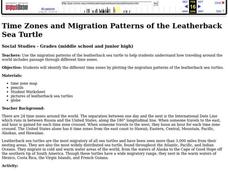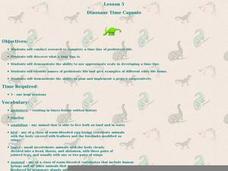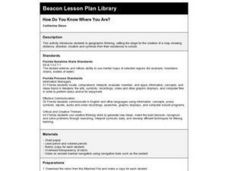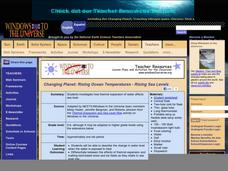Curated OER
Build Your Own Sea Turtle
Students design and create their own sea turtles. They investigate the marine turtle anatomy by constructing a model of a sea turtle. They incorporate the vocabulary that identifies each part of the sea turtle's anatomy.
Curated OER
Ocean Life Poetry: Limericks & Cinquain Poems
Young oceanographers conduct independent online research to learn about ocean life, explore limerick and cinquain poem structure and syllabication, and produce poetry that conveys the information they found. Links don't work, but it's...
Curated OER
Ocean Life
Students explore the types of plants and animals that can be found in the ocean. They browse books and/or magazines to identify and gain a knowledge base of plant and animal life found in the ocean, then create a collage.
Curated OER
Change Agents
Third graders experiment with three erosive change agents. They do an observation log, which they present to the class through a song, poem or skit.
Curated OER
Understanding Climate
Fourth graders create two dioramas out of household materials to compare the influence of various factors that impact climate. Each group discuss how the change in factors influenced the climate, flora, and fauna of their area.
Curated OER
"Cloudy with a Chance of Meatballs": DRA
Students participate in a directed reading of "Cloudy with a Chance of Meatballs," doing word work, comprehension activities, and presentations.
Curated OER
NASA Robots
Students discuss the needs for robots in space discovery, and take turns simulating a robot and controller to demonstrate the difficulties of programming a robot to successfully complete simple tasks.
Curated OER
Exploring Landforms
Second graders discuss the different types of landforms throughout the world. They pick one and research and present it to the class.
Curated OER
Diary of a Worm Secret Agents
Second graders explore the geography of Washington D.C. and President Bush's hometown of Crawford, Texas. They read the book, Diary of a Worm, determine the best route to go to Texas from Washington D.C., and throw a birthday party for...
Curated OER
Earthquake!
Students gain an understanding of earthquakes. They examine vocabulary associated with earthquakes, how earthquakes happen, and preventive measures taken to diminish damage or harm in the event that an earthquake should happen.
Curated OER
Renewable vs. Non-Renewable Resources
Fifth graders identify renewable vs. non-renewable resources and comprehend why conservation of resources is important. They are asked what they think the words natural and resource mean. Pupils then put the words together to define...
Curated OER
Water, Water Everywhere
Students explore water. In this water cycle lesson, students conduct a scientific investigation that requires build a terrarium models of the earth. Students record their observations of the changes regarding water in the terrarium.
Curated OER
Time Zones and Migration Patterns of the Leatherback Sea Turtle
Students identify the different time zones by plotting the migration patterns of the leatherback sea turtles. They discover that traveling around the worlds includes passage through different time zones.
Curated OER
Learning From Leaves: A Look at Leaf Size
Students measure and analyze leaves from various environments. They discuss the environments, and make inferences about environmental variables that could have contributed to the differences in leaf size and texture.
Curated OER
Learning From Leaves: Adaptations To Differing Light Levels
Pupils, in groups, examine plants with different light levels. They are given plants from a tropical and desert region. They write a hypothesis at the beginning of the experiment.
Curated OER
Dinosaur Time Capsule
Third graders research prehistoric life using educational software. They design a prehistoric life while showing the use of appropriate scale and names for the prehistoric life. They follow an internet link to participate in a virtual...
Curated OER
Fish In a Bottle
Students work together to build their own fish ecosystems. As a class, they share their prior knowledge about catfish and use a diagram to label its body parts. They record their observations of the ecosystem and determine what they...
Curated OER
The Planet Earth
Students explore the planet Earth, outer space, and Earth's axis. They demonstrate reading comprehension skills, including literal meaning, inference and critical analysis.
Curated OER
How Do You Know Where You Are?
Seventh graders are introduced to geographic thinking, setting the stage for the creation of a map showing distance, direction, location and symbols from their residences to school.
Curated OER
Geography Overview
Second graders look at the United States often over the next few months. Help them to see how the United States has changed as territories have become states. They may be surprised to know the areas of our country that were territories...
Curated OER
Changing Planet: Rising Ocean Temperatures - Rising Sea Levels
As an anticipatory set, young environmental technicians watch a video about how ocean temperatures seem to be changing along with the global climate. They perform a laboratory demonstration with the purpose of observing what happens to...
Curated OER
Earth from Space Maps
Students use photo images from space to create a large map of the United States or the world, find where they live and label other places they know. They are exposed to a Web resource that allows them to view photo images of Earth taken...
Curated OER
Giant Smelly Plant Attracts Thousands
Read and discuss a news article about a rare corpse plant that bloomed in Washington D.C. Because this native Indonesian plant blooms so rarely, people flock to see it. After reading the article, your class answers comprehension...
Curated OER
Fish Workings
Students observe, hypothesize, and draw conclusions regarding fish. They examine their anatomy, and how they function in their environment.
Other popular searches
- Math Lessons on Oceans
- Pre K Lessons on Oceans
- Prue K Lessons on Oceans
- Drama Lessons on Oceans
- Pr K Lessons on Oceans























